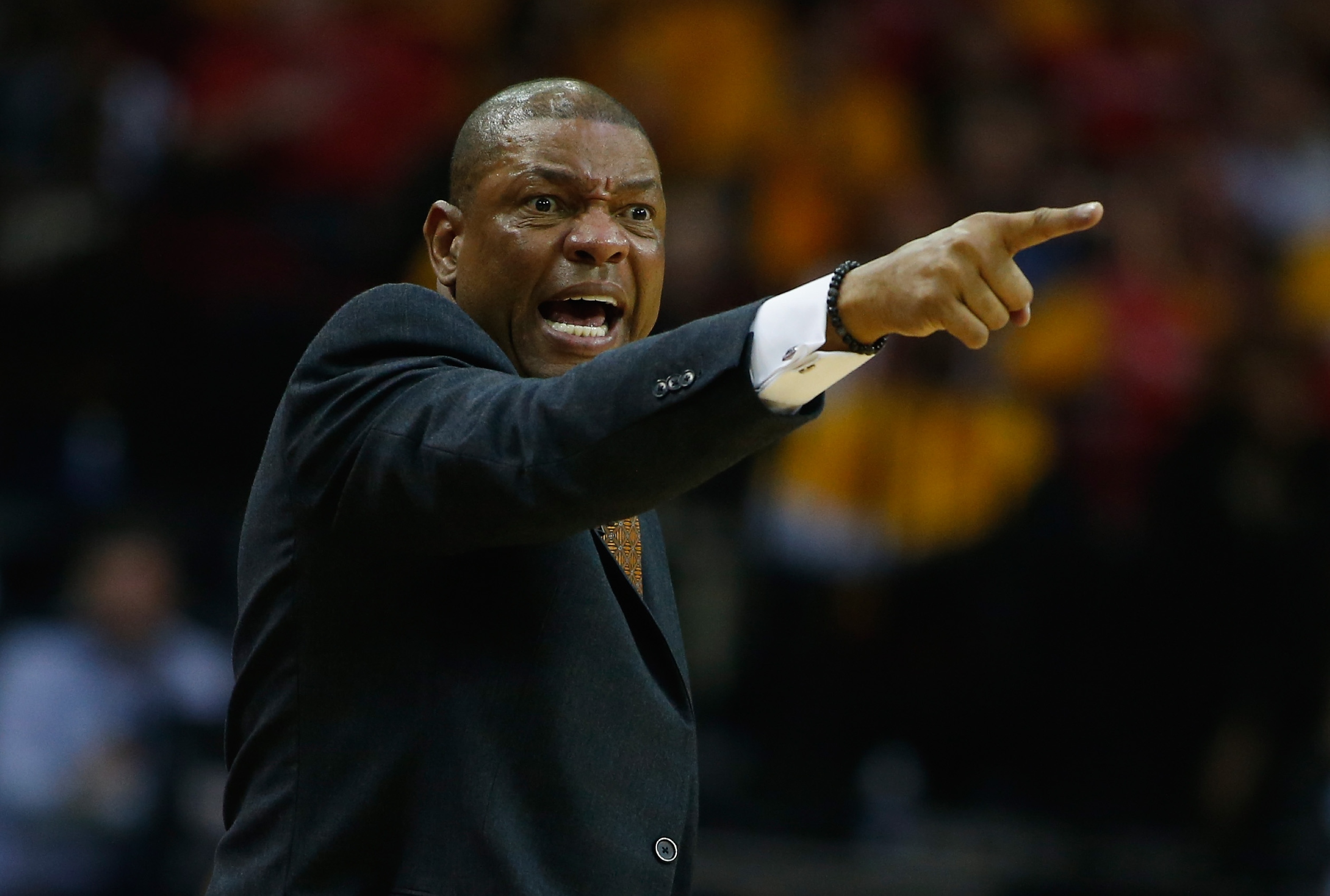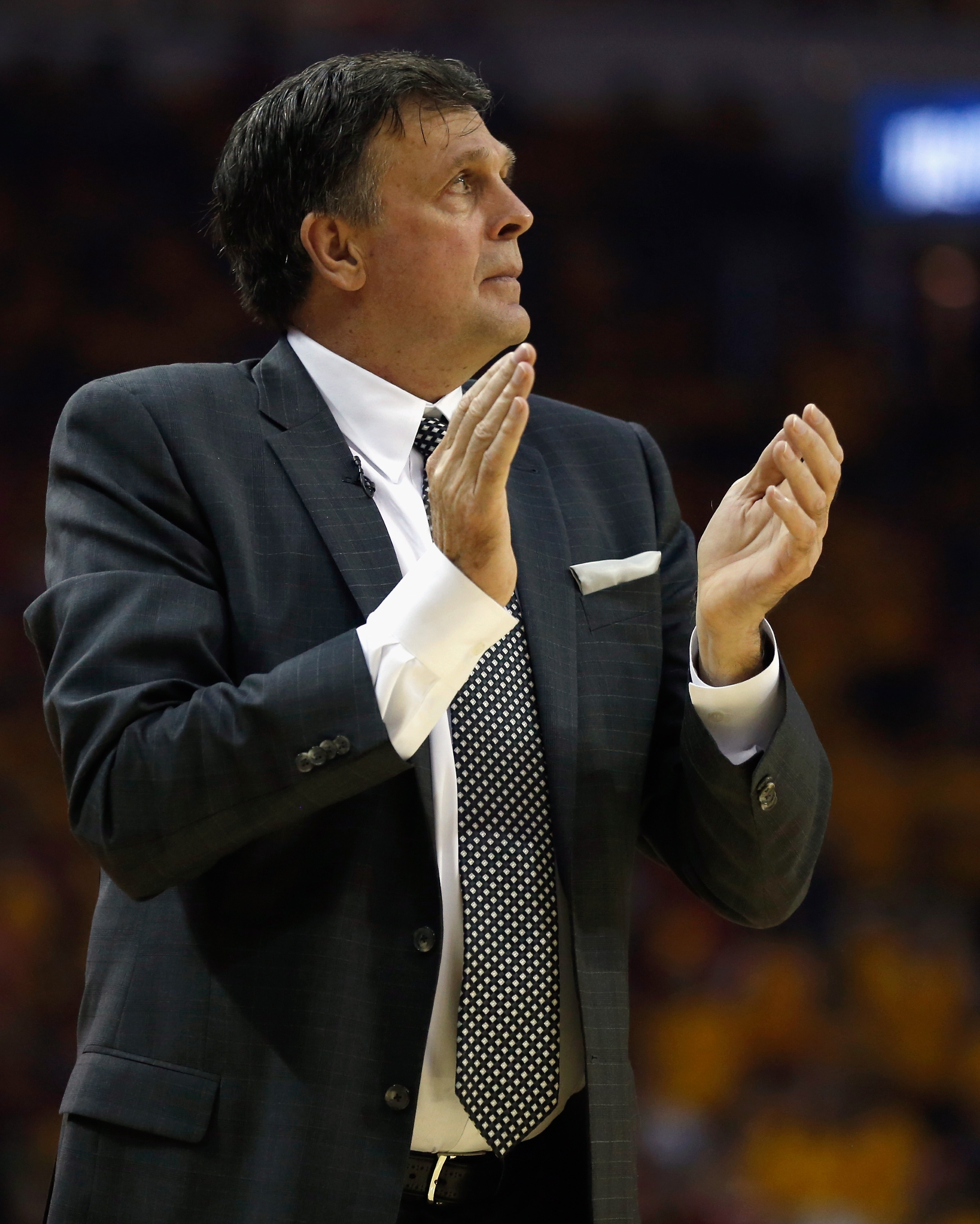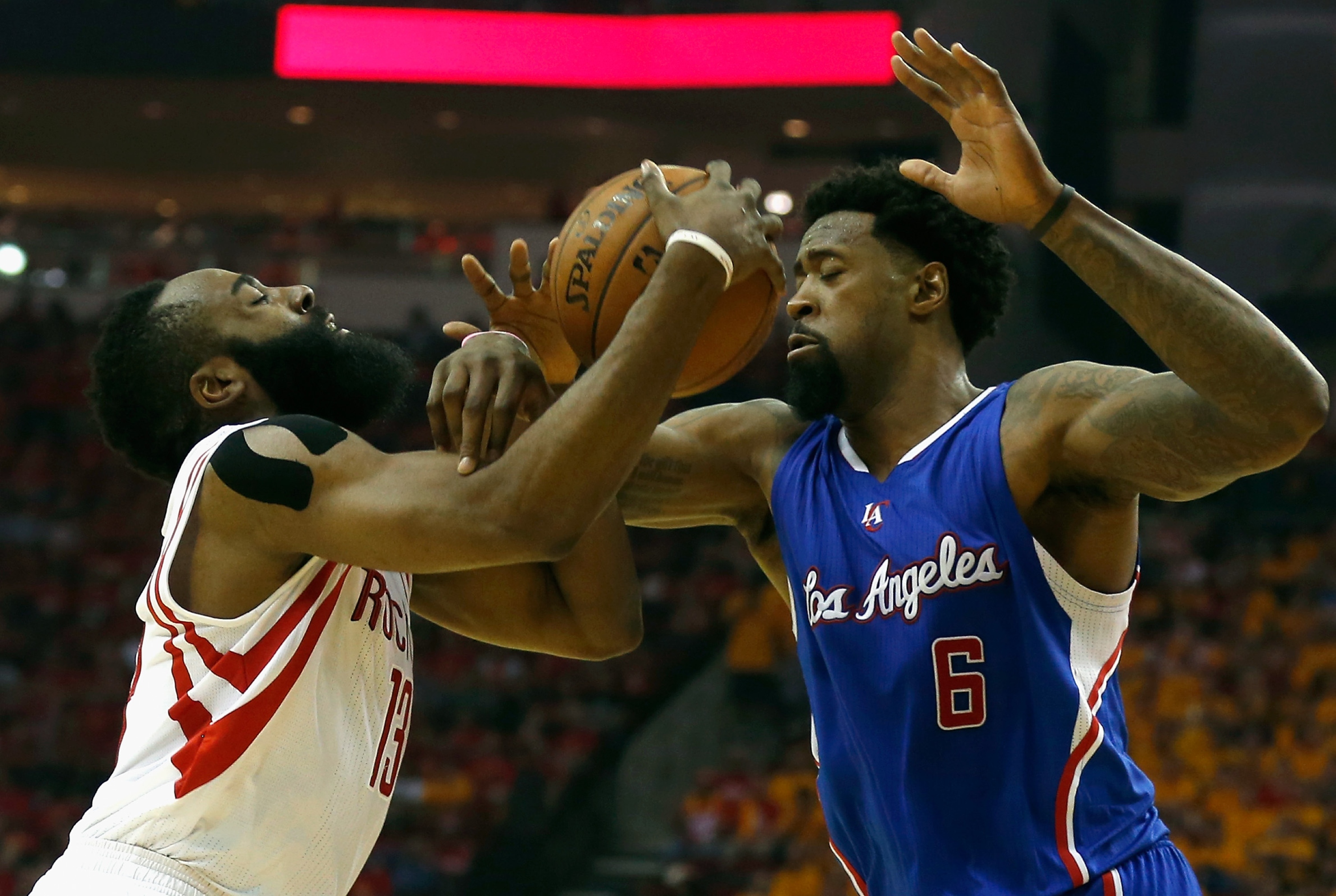Doc demands desperation, McHale advocates aggression in Clips-Rockets Game 6
After getting smoked by the Houston Rockets in Game 5 of the Western Conference semifinals on Tuesday, with James Harden logging a triple-double and Dwight Howard bouncing back with 20 points and 15 rebounds to stave off elimination, Blake Griffin said he and his Los Angeles Clippers teammates played “like we had a couple of bullets in the chamber.” That might not be the killer instinct you’d want in a team fighting for an NBA championship, but the Clippers did have a cushion after stomping the Rockets in Games 3 and 4 to take a commanding 3-1 lead; you could understand them taking their foot off the proverbial gas just a bit.
[Follow Dunks Don’t Lie on Tumblr: The best slams from all of basketball]
With the series returning to Staples Center for Thursday’s Game 6, however, Clippers coach Doc Rivers wants to see his team push the pedal to the metal from tipoff. From Melissa Rohlin of the Los Angeles Times:
Rivers said that the players were disappointed with how they played, and most of them re-watched Game 5 on the plane ride home from Houston late Tuesday evening. He said close-out games are always the most difficult games to win.
“One reason is the other team doesn’t want to go home,” Rivers said. “I think people forget that…I think that’s part of it, and then the other part is the human nature. When you have a game in the bank, sometimes you don’t play with urgency, and the fight, and the desperation that you should. You have to do that every playoff game, you just can’t pick and choose.”
What Rivers is criticizing in the playoffs actually proved to him during the regular season just how good his team could be.
“What stood out to me is during the middle of the year, and even early in the year, this team did pick and choose, and I didn’t like it, but the games they chose were pretty good games,” Rivers said. “That told me that this team has a chance.”
But by “picking and choosing” Game 5, they gave the Rockets a sliver of a chance, too.
The odds aren’t great — only eight teams in NBA history have come back from a 3-1 deficit to win a seven-game series, and ESPN’s Basketball Power Index formula still gives the Clips an 87 percent probability of knocking Houston off. But they look a bit better than they did before Tuesday, thanks in large part to the Rockets getting their offense back on track after getting smothered in L.A, as coach Kevin McHale told Jonathan Feigen of the Houston Chronicle:
“We had 64 points in the paint. We have to press the paint and make them aware we’re coming down there. The referees have to make decisions. We come in there. Bodies hit. You’re not going to get all the calls, but you have to attack. From the attack, we’re going to get our shots on the perimeter. Beat your guy, the big steps up, the guard comes in to attack, it opens up corner 3s.” […]
They were so pleased with how they won, they even sounded like themselves. Harden said the Rockets had regained their “swagger,” Corey Brewer cited their “pace” and “tempo,” and Trevor Ariza pointed to “intensity.”
They all cited “aggressiveness,” which came in many forms, but none as obvious as the combined attitude and tactical adjustment of taking the attack to the rim and the heart of the Clippers’ defense.
“I just felt like the more aggressive we are, the more relaxed we become,” Ariza said. “When we are attacking the paint and when we are playing from the inside then going outside, we are a better team.”
As my colleague Eric Freeman noted, there was a pretty big reason why the Rockets were both more willing to attack the rim in Game 5 and more successful when they got there. Clippers center DeAndre Jordan played just 9 1/2 minutes in the first half, and only 24:13 overall, as he battled foul trouble.
Removing Jordan from the game does a lot more than just limit the likelihood that we’ll be subjected to endless Houston hacking. It also takes away the Clippers’ premier rim protector and pick-and-roll-corralling big man, while forcing the likes of Spencer Hawes and Glen Davis into prominent defensive roles.
That, of course, is a problem, as Sports on Earth’s Michael Pina details:
The Clippers allow an utterly insane 21.3 fewer points per 100 possessions when [Jordan is] on the floor. Whenever any other player on the roster is getting rest, including Paul and Griffin, L.A. posts a positive net rating. When Jordan sits they’re outscored by 16.2 points per 100 possessions. Even after taking into account the expected inflation that comes with such a limited sample size, these numbers make the regular season’s third runner-up for Defensive Player of the Year look like a mountain man.
Over the past five games, Harden is shooting 40.5 percent with Jordan on the court — prowling the back line, corralling pick-and-rolls, turning downhill drives into lurching jumpers — and 50 percent when he’s on the bench. The percentage of Harden’s points that arrive in the paint nearly doubles depending on who Rivers rolls out as the opposing center. […]
In this series, Howard is making 52.8 percent of his baskets with Jordan in the game and 65 percent when he’s battling Glen Davis, Griffin or Hawes. Without Jordan out there fighting for rebounds and making Howard scratch and claw for every inch in the post, Houston’s center is a comfortable wrecking ball who shoots 85.7 percent in the restricted area. When Jordan’s on the floor that number plummets by 21.7 percent.
The key for the Rockets, then, will be to attack the rim repeatedly in hopes that, as dominating a defensive deterrent as DeAndre can be, they can force his hand into a couple of quick whistles that once again force Doc to decide between pulling his paint protector or risking even more damaging foul trouble in the early-going.
Houston has been somewhat less successful in generating calls on the road than at home in the postseason. While Harden, Howard and company drew roughly the same number of personal fouls (20.9 per game at home, 21 per game on the road) and shot free throws about as often (26.2 attempts per game at home, 25.5 per game on the road) during the regular season they’ve averaged about two fewer personals drawn (26.3, compared to 28.2) and eight fewer freebies (32.3, compared to 40.3) on the road in the postseason.
Whether or not they get the benefit of the whistles on Thursday, the Rockets must continue pressing the action and playing with the desperation of a team that has no tomorrow, no more “bullets in the chamber,” if they let up. If they’re successful, they could give the Clippers a very good reason to start feeling a sense of urgency — the need to go win a Game 7 on the road, which is something just 24 teams have done in 119 tries in NBA postseason history.
– – – – – – –
Dan Devine is an editor for Ball Don’t Lie on Yahoo Sports. Have a tip? Email him at [email protected] or follow him on Twitter!
Stay connected with Ball Don’t Lie on Twitter @YahooBDL, “Like” BDL on Facebook and follow Dunks Don’t Lie on Tumblr for year-round NBA talk, jokes and more.


